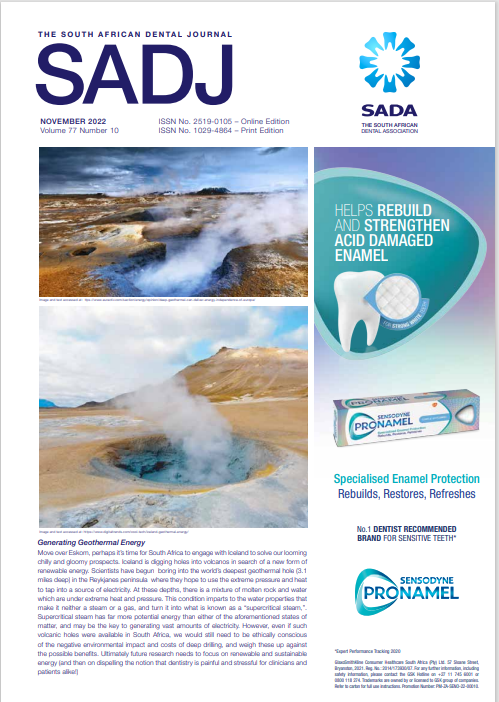Evaluating the oral health knowledge, attitude and practice among undergraduate students and staff at selected federal University in Imo state, Nigeria
DOI:
https://doi.org/10.17159/2519-0105/2022/v77no10a4Keywords:
Attitude, Knowledge, practice, oral health, universityAbstract
Oral health is an essential component of an individual’s general health and overall well-being. Although past studies have evaluated oral health knowledge, attitude and practices (KAP), little is known about the level of KAP between students and staff of higher education institutions. This study aimed to evaluate oral health knowledge, attitudes, and practices among undergraduate students
and staff at a selected University of Technology in Nigeria. A multicentre cross-sectional survey was conducted between May – June 2021 with a sample of 747 consisting of 378 students and 369 staff, recruited from 8 faculties across the University. One-way ANOVA test was applied for the statistical evaluation of numerical measures. The association between knowledge, attitudes and practice scores were assessed using Pearson correlation analyses (α=.0.05). No significant differences were found in the oral health knowledge, attitude, and practices between the students and staff (P>0.05). Overall, the finding suggests that 84.3% of the respondents had a positive attitude toward oral health, 92.5% had high knowledge and 87.4% practised oral health was adequate. The respondents KAP differed by socio-demographic characteristics. The relationship between knowledge and practice was fair (r = 0.358, p < 0.01) while positive weak correlations were observed between attitude and practice (r = 0.198, p < 0.01), and between knowledge and attitude (r = 0.173, p < 0.01). The salient feature of this study suggests that while there was a high level of knowledge among the respondents,
the attitude and actual practice of oral healthcare does not commensurate with the level of knowledge. Nonetheless, it was found that knowledge had positive associations with the practice of oral health care. The findings suggest there is a need to improve the
knowledge about oral health practice among both staff and students through a tailored design of community based awareness to increase oral health practice.
Downloads
References
Sabbah W, Tsakos G, Chandola T, et al. Social gradients in oral and general health. J Dent Res 2007; 86: 992-996.
Farsi NJ, Merdad Y, Mirdad M, et al. Oral health knowledge, attitudes, and behaviors among university students in Jeddah, Saudi Arabia. Clin. Cosmet. Investig. Dent 2020; 12: 515.
Petersen PE, Bourgeois D, Ogawa H, et al. The global burden of oral diseases and risks to oral health. Bull. World Health Organ. 2005; 83: 661- 669.
Peres MA, Macpherson LM, Weyant RJ, et al. Oral diseases: a global public health challenge. Lancet 2019; 394: 249-260.
5. Regional Committee for Africa. Regional oral health strategy 2016-2025: addressing oral diseases as part of NCDs (Document AFR/
RC66/5). World Health Organization. Regional Office for Africa. 2016.
WHO. World Oral Health Day 2022. 2022. WHO Regional Office for Africa.
Hobdell M, Clarkson J, Petersen P, et al. Global goals for oral health 2020. Int Dent J 2003; 53: 285-288.
Onwubu SC, Mdluli PS and Singh S. Evaluating the buffering and acid-resistant properties of eggshell–titanium dioxide composite against erosive acids. J. Appl. Biomater. Funct. Mater 2019; 17: 2280800018809914.
Kathmandu RY. The burden of restorative dental treatment for children in Third World countries. Int Dent J 2002; 52: 1-9.
Glick M, Williams DM, Kleinman DV, et al. A new definition for oral health developed by the FDI World Dental Federation opens the door to a universal definition of oral health. Br Dent J 2016; 221: 792-793.
Peltzer K and Pengpid S. Oral health behaviour and social and health factors in university students from 26 low, middle and high income countries. Int. J. Environ. Res. Public Health 2014; 11: 12247-12260.
Bashiru BO and Omotola OE. Oral health knowledge, attitude and behavior of medical, pharmacy and nursing students at the University
of Port Harcourt, Nigeria. J. Oral Res. Rev 2016; 8: 66.
Kumar H, Behura SS, Ramachandra S, et al. Oral health knowledge, attitude, and practices among dental and medical students in Eastern India–A comparative study. J. Int. Soc. Prev. Community Dent 2017; 7: 58.
Al Subait AA, Alousaimi M, Geeverghese A, et al. Oral health knowledge, attitude and behavior among students of age 10–18 years old attending Jenadriyah festival Riyadh; a cross-sectional study. Saudi J Dent Res 2016; 7: 45-50.
Peker I and Alkurt MT. Oral health attitudes and behavior among a group of Turkish dental students. Eur. J. Dent 2009; 3: 24-31.
Petersen PE, Baez RJ and World Health Organization. Oral health surveys: basic methods. 5th ed.: World Health Organization., 2013.
Zhu L, Petersen P, Wang H, et al. Oral health knowledge, attitudes and behavior of children and adolescents in China. Int Dent J 2003; 5: 289-298.
Vadiakas G, Oulis C, Tsinidou K, et al. Sociobehavioural factors influencing oral health of 12 and 15 year old Greek adolescents. A national
pathfinder survey. Eur Arch Paediatr Dent 2011; 12: 139-145.
Broadbent J, Thomson W and Poulton R. Progression of dental caries and tooth loss between the third and fourth decades of life: a birth
cohort study. Caries Res 2006; 40: 459-465.
Abid A, Maatouk F, Berrezouga L, et al. Prevalence and severity of oral diseases in the Africa and Middle East Region. Adv. Dent. Res 2015; 27: 10-17.
Suprabha BS, Rao A, Shenoy R, et al. Utility of knowledge, attitude, and practice survey, and prevalence of dental caries among 11-to 13-yearold children in an urban community in India. Glob. Health Action 2013; 6: 20750.
Rad M, Shahravan A and Haghdoost AA. Oral health knowledge, attitude, and practice in 12-year-old schoolchildren in Iran. J Int Soc Prev Community Dent 2015; 5: 419.
Mitrakul K, Laovoravit V, Vanichanuwat V, et al. Factors associated with parent capability on child's oral health care. Southeast Asian J Trop Med Public Health 2012; 43: 249.
Sambunjak D, Nickerson JW, Poklepovic T, et al. Flossing for the management of periodontal diseases and dental caries in adults. Cochrane
Database Syst Rev 2019.
Jaber MF, Khan A, Elmosaad Y, et al. Oral health knowledge, attitude and practices among male Qassim university students. Int J Community Med Public Health 2017; 4: 2729-2735.
Wahengbam PP, Kshetrimayum N, Wahengbam BS, et al. Assessment of oral health knowledge, attitude and self-care practice among
adolescents-a state wide cross-sectional study in Manipur, North Eastern India. J. Clin. Diagnostic Res 2016; 10: ZC65.
Beaton L, Freeman R and Humphris G. Why are people afraid of the dentist? Observations and RESEARCH < 617explanations. Med Princ Pract 2014; 23: 295-301.
Kassak KM, Dagher R and Doughan B. Oral hygiene and lifestyle correlates among new undergraduate university students in Lebanon. J Am Coll Health 2001; 50: 15-20.
Harris NO and Garcia-Godoy F. Primary preventive dentistry. 8th ed.: Upper Saddle River, NJ: Pearson Education, 2014.
Clark-Perry D and Levin L. Comparison of new formulas of stannous fluoride toothpastes with other commercially available fluoridated toothpastes: A systematic review and meta-analysis of randomised controlled trials. Int Dent J 2020; 70: 418-426.
31. Tada A and Hanada N. Sexual differences in oral health behaviour and factors associated with oral health behaviour in Japanese young adults. Public Health 2004; 118: 104-109.
Downloads
Published
Issue
Section
License

This work is licensed under a Creative Commons Attribution-NonCommercial 4.0 International License.






.png)